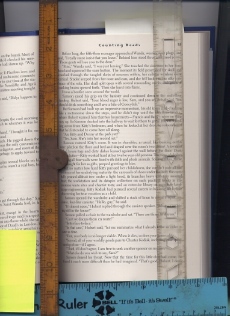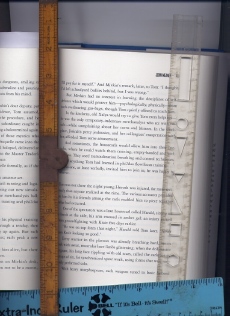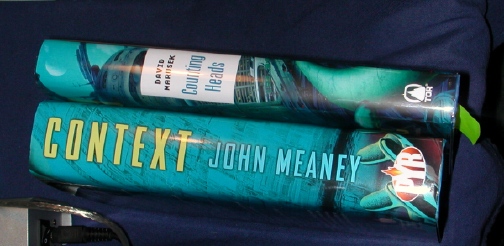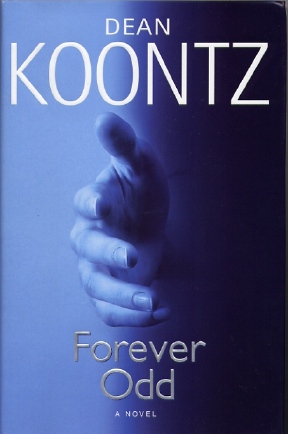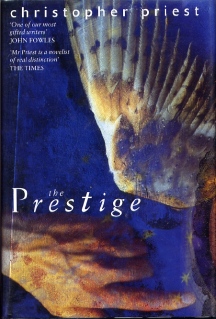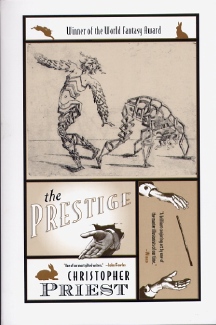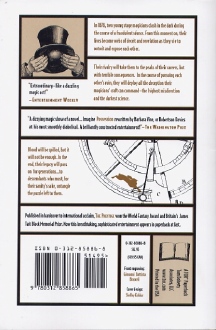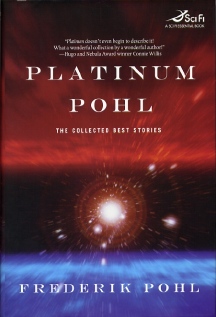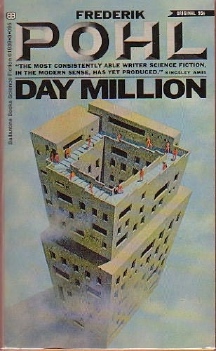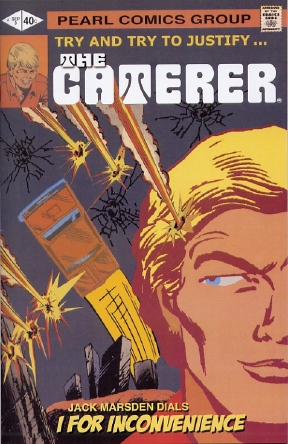|
|
|
This Just In...News from the Agony Column
|
12-16-05: A Brief Leading Rant |
||||||||||||||||||||||||||||||
| Mine
Eyes Have Squinted at the Glory OK. I'll finish up the week with a brief rant on an obscure topic. Leading. Rhymes with heading. What the hell is leading and why do you care about it? Well, it's the space between lines of type in a book or a magazine or even a website, and often it might be the difference between reading and enjoying or merely reading a book. It might make you pick up one book or put down another. It can mean that your – that is you, the publisher's – books are taken to the checkout counter or left behind on the shelves. And if you, the publisher, think we, the public, dont care about leading, think again. I write this because I'm currently intently, sticky-note-annotating-reading and enjoying David Marusek's 'Counting Heads'. I first wrote about this back in October, but it didn't get into the sticky-note reading queue for say another month and a half. Among the reasons (I do have some assignments these days) is the fact that every time I picked up the book and opened it up, the pages just seems so...cramped. As fascinating as the writing seemed, visually, the interior of the novel was rather off-putting. I didn't really think about it all the times I picked it up. I'd just look at it, bounce off that presentation (I know now) without thought and then go on to the next one. The premise was very appealing to me. I'm all for a good class-warfare novel. Hell, I'm all for class warfare. Let them eat cake! Eat the rich! Amen, brother! Well, eventually, I broke down and decided to have a bit of cake with the rich. (Side dish or company? You decide!) But as I read the novel, the layout began to bug me to the point that I figured out that it was the layout that was bugging me. So, like any good reader of science fiction, I decided to perform a little experiment. I got out the rulers, the exemplar book and got to measuring the levels of my annoyance. The exemplar book I chose was John Meaney's 'Context' as published by Pyr. And the difference between the two is pretty phenomenal, to my mind. What I've done is to give you right here in River City, the pages from each book side by side, so you can get an idea of what's going on. Also, the images are linked to full-size images, so you can really get a look at what's going on.
In 'Context', the top margin is a whopping 1 1/4". The bottom margin is 3/4". The outer margin is 5/8" and the inner margin is 3/4". There are a mere 32 lines of type per page. I'll lay this out in a table for your comparing pleasure. What you want the characters per line as well? Oh hell, give me a couple of minutes here. OK, the Meany came back at 70 characters per line and the Marusek came back at 75. Now, let's do a little calculation. Hmmm. 51 lines times 75 characters comes back to...3,825 characters per page for the Tor book. And the Pyr, huh...32 times 70...2,240 characters per page. Now let me dredge out my rudimentary math skills here....The Pyr book has 59% of the characters per page that the Tor book has. (Wait! Tor? Pyr? Never noticed that! Three characters ending in an "r." Oh the joys of book obsessions.) Or to invert it, each page of the Tor book has the equivalent of 1.69 pages of the Pyr book. So the 336 pages of Marusek would be...wait for it...568 (rounded up) pages were it to be printed by Pyr. (The Meaney novel is 531 pages, which suggests that it's actually shorter than the Marusek. But look at them in a side-by-side photo.)
Now, I'll be the first to admit that these measurements are 1) Very unscientific, 2) Meaningless in terms of the content. I'm suggesting that readers of this column would enjoy the pure content of both books highly, and you should buy 'em both in hardcover.
Then I suspect that you (or I) would be much more likely to actually give the Meaney a chance. I mean, I had both and stared at the Marusek many a time before tucking in with a stack of stickies. (I'm reserving the Meaney for a re-read of 'Paradox', then the rest of the series.) Even the most comfortably appointed bookstore is not your study, your living room or your back porch. If I were to sit down with something or even just to read while standing up, the Meaney would be much, much easier to read. It could get my attention and more likely my dollars. That said, the Marusek lives up to the hype^H^H^H^Hmany glowing reviews it gets, and is certainly worth your time. Should you go to the bookstore and pick it up, don't hold the tight formatting against it. On the other hand, congratulations are certainly in order to Bruce Carle over at Pyr, who does the layout. And furthermore, Pyr is bringing out a hardcover edition of 'To Hold Infinity' by Meaney, with the original Jim Burns artwork being given as Lou Anders told me, "the Hardcover edition it deserves!" So yes, we are rather obsessed and obsessive over here at The Agony Column. And unscientific readers of science fiction and performers of science experiments. And I love the Marusek; I just sent an email to one of my reading buddies suggesting he hie himself hence to the bookstore and pick up 'Counting Heads'. You should too. But just as importantly, you should buy each and every book that Pyr puts out, especially these Meaney novels. Wait? Did I say this was going to be a brief rant? Well, maybe it will look brief, if I just change the leading, right? |
||||||||||||||||||||||||||||||
|
12-15-05: Dean Koontz is 'Forever Odd' |
|||
Remember
The Atlantic
Back in the day, I really liked the Koontz and King titles, because both used lots of science fiction elements in their contemporary horror stories. And I have to admit, I think I'd still enjoy those titles. Both offered lots of interesting monsters, particularly the Koontz novel. I know that it remains a favorite among his fans even to this day. I enjoyed the Koontz novels that I read in the following years, some written before and some written after 'Watchers'. Yes, one of the reasons I got such a kick out of them was that they were for the most part set in Orange County, California, where I'd lived and gone to college. In fact, there's a memorable scene in 'Watchers' that plays out in the development where my parents eventually moved. The scene finds The Other, a compellingly terrifying but sympathetic monster, stalking two cops in a skeletal suburban development. I can visit that scene in my memory as if I were there with the cops and the monster. That's evidence of great writing skills. 'Watchers' is one of the all-time most recommendable, most enjoyable novels to come out of the 1980's horror boom. If you've not read it, or any other Koontz, it's well-worth hunting down. Of course, with Koontz popping out thrillers at a fairly torrid pace and a series of resolutely bad movie adaptations of which the author has written quite humorously, it's easy to forget that Koontz got his start many, many years ago when he won a short story contest from the now ultra-high-falutin' Atlantic Monthly. He's a talented guy. But I pretty much stopped reading his stuff after reading 'Mr. Murder', a novel that seemed as if it might have been written while the author was asleep. Yes, it was pulse-pounding, etc etc, but it was also so familiar that the seams were quite clearly visible. I did briefly resume reading when he brought out two novels for Cemetery Dance, 'Fear Nothing' and 'Seize the Night'. I rather enjoyed those books, even if they did simply retread the formula that made 'Watchers' a favorite. Smart dog, quirky guy, conspiracies and monsters. Well, those monsters will get me interested just about every time. Unfortunately, I got the idea that there would be a third book in the series, and I'm still waiting. Now if youre waiting for a sequel to Koontz's 2003 thriller-for-the-year 'Odd Thomas', you need wait no more. 'Forever Odd' (Bantam / Random House ; November 29, 2005 ; $27.00) hit the bookstores (and the Rolling Shelves) a couple of weeks ago, and it looks worthy enough to make one want to hunt down the original. The premise here is not exactly headline news. Odd Thomas exists, "between two doors, between a life with the living and a life with the dead." Presumably he felt some simpatico with the kid from 'The Sixth Sense,' got the message that he was not alone. But you know, these sorts are always beloved by the community and yet ultimately alone. So get used to it! Thomas hasnt however, but a brutal murder provides some distraction for our moping hero. Damn, isnt it always the case that brutal murder will put things in perspective. You know, like bloodstains. Of course, you murder the friend of a psychic at your peril. Youd better be pretty damn evil if youre going to go after a psychic's friends, and apparently, that's the case here. What's also the case and quite encouraging is that Koontz wrote something he cared enough about to follow up, and he set it in one of his wonderful trademark California sort-of small towns. This last point is of vital importance to YT. For those outside of our fair state (no need to move here, we'll all write about how wonderful it is without you), California doesn't really have small towns in the classic small-town sense of American fiction. But we do have these sort of weird sprawling suburbs, and if you get yourself in one that's small enough yet connected enough you do get some of the effects of the traditional American small town, if you hang around long enough. I've found that it certainly improves on your behavior in public places. I'm no longer the guy who shouts, "FUCK!" in the parking lot. (Apparently I save it for this website.) You get to know people in this sort of stretched-out manner. Combined with the generally comfortable climate, well, you can get used to living here, and after a time it can seem really idyllic. Koontz has managed to capture the attraction of California's small cities, and I'm pretty interested in visiting "Pico Mundo, California." Written in the first person in chapters as short as the average attention span, Koontz's new novel seems like a smart bet for the bestseller list. I'll be happy to spend few afternoons in this small town, even if I have to hunt down the first book in the series. And my expectations are properly set. I'll not be waiting for a third volume here. But when I pull into the city limits of Pico Mundo, I wont be surprised if I meet up with a smart dog. |
|
12-14-05: Christopher Priest's 'The Prestige' |
|||||||
Back
From Tor As If By Magic
The fact that St. Martin's Press issued the first hardcover edition over here in the good old US of A should be your cue to guess that Tor is taking no time in re-issuing the trade paperback of 'The Prestige' (Tor / Tom Doherty Associates ; December 14, 2005 ; $14.95). Unless you're really, really rich, I'd wait until long after the movie has come and gone to seek out a first edition. Did I mention the movie? I guess I did. Or more precisely, Tor did, along with just about everybody else in the entertainment industry. In fact, on the first page of their publicity materials accompanying the re-issue, there's not mention of the book itself. There's a picture of the reissue, but that's it. Otherwise, they trumpet the stars that were signed on before the re-release; director Chris (Memento) Nolan, actors Christian Bale, Hugh Jackman and Michael Caine. In the interim, we've heard that David Bowie has been pegged to play Nikolai Tesla and Scarlett Johanssen to play a comely magician's assistant. Christopher and Jonathan Nolan are writing the screenplay. As adaptations go, it seems to have a good start.
Priest was a science fiction writer for many years before he wrote 'The Prestige' and he brings the world-building feel of science fiction to his historical fiction. But like many science fiction writers, he understands that it really helps to start his work in the present to take readers on the journey from the world they know into the world he will create. By doing so, he manages to increase the tension, because he's telling two stories in parallel, and as readers our drive to finish the narrative is doubled. But Priest is also a consummate prose stylist. He writes both portions of the narrative in the first person, and there's a real joy to be found in the stylistic differences between the two speakers. Priest does a masterful job at creating stories within stories, narratives within narratives, at turning his novel into a prose version of the illusions he describes. It won a World Fantasy Award and Britain's James Tait Black Memorial Prize, back in the day. 'The Prestige' also brought Priest back out into the limelight. Since the publication of 'The Prestige', Priest has authored two novels. 'The Extremes' is a twisty science fiction novel about virtual reality, while 'The Separation' is a subtle, dense exploration of twins, doppelgangers and alternate timelines. It was first published as a trade paperback in the UK by Simon & Schuster. Victor Gollancz, ever in the forefront, published it first as a hardcover after the trade paperback original, which was barely printed and barely distributed. The S&S originals are now selling for somewhere in the range of $100 a pop. And I'm happy to report that by the time 'The Separation' came out, I was in full-blown double-book buying mode. Interestingly enough, even though Tor itself published a trade paperback edition of 'The Prestige' back in 1997, this edition claims that, "this breathtaking, sophisticated entertainment appears in paperback at last." Hmm. Someone needs to run a quick check on Bookfinder before they write cover copy, eh? Oh well. At least the cover design is rather nice, though it's not a patch on the UK HC original. And expect to see more versions if the movie itself moves from fiction into fact. Now that's a magic trick that's a lot harder to accomplish. And for those who read the novel, a truly superfluous trick at that. |
|
12-13-05: 'Platinum Pohl' |
||||||
Actually
Essential
"Each month Sci Fi selects a Tor science fiction or fantasy title and designates it a Sci Fi Essential. Through their Essential Program, Sci Fi seeks to foster writing excellence, to bring powerful voices to the attention of their audience, and to bring readers closer to the authors they are passionate about." Hey, who let the Marketing Department out of their cubicle area? Now to me, essential literature would be those works that should be must be read to understand the canon, to put it in perspective. And certainly 'Platinum Pohl' (Tor Books / Tom Doherty Associates ; December 12, 2005; $27.95) would qualify as essential. Here's a book that captures the best work of SFWA Grand Master Frederik Pohl, a book that contains stories that inform all the writing that has been done since they were first published. Whatever! Who let Rick into the marketing department? The deal with Frederik Pohl for me is that his books were among the first I collected, period. Back in the late 1960's and early 1970's, Ballantine put out a series of paperbacks collecting the stories of Frederik Pohl, and these were among the first science fiction books I remember buying. I even managed to find a picture of one of those editions, and boy, it brought back the memories. These were the stories that shaped my understanding of what science fiction could do. In the hands of a writer like Frederik Pohl, science fiction can do anything it wants to, which is in turn why I like the genre. No limits, which means that it can read not just like, "Golly gee-whiz!" but also like well-written literary fiction. With a twist.
But here's the deal. If you're reading science fiction regularly enough to be interested in some of the other notable titles in this series, like Cory Doctorow's 'Someone Comes to Town, Someone Leaves Town' or John Scalzi's 'Old Man's War', then you owe it to yourself to pick up 'Platinum Pohl' and put it on your bed stand next to 'The Complete Stories of Arthur C. Clarke'. Read one of each per night. Steep yourself in the history of our imagined future, and you'll find more than a few familiar tropes haunting your dreams. Understanding the history of how we imagined the future -- which is now our present -- is to my mind essential. Pohl will tell you where we thought we were going. You might have some ideas about where we ended up. Understanding the difference is without doubt essential if we're to have any idea of where we're headed now. |
|
12-12-05: Buy Steve Aylett's 'The Caterer' |
|||
No Justification Required
If you'd just exercise your nerves regularly, they wouldn't need rest. And believe me, reading 'The Caterer' will give your nerves the workout they need, the workout they deserve. So just to bring newcomers up to date and to once again visit one of my favorite recent works...'Lint', by Steve Aylett is the biography of science fiction writer Jeff Lint. Lint the writer is more than a little peculiar. From his time with the Beats to his never-aired Star Trek script, Jeff Lint beat his own path, and frequently his head against walls both real and imagined. He was more than a little crazy, and it was reflected in his fiction, which was more than a lot crazy. From novels like The Stupid Conversation to Jelly Result, from his TV cartoon characters Catty and the Major to his cult 1970's comic The Caterer, Lint was a man not just ahead of his time, but out of his time as well as his mind. According to his website, jefflint.com, Lint, "Like his contemporary, Philip K. Dick, did not gain any widespread recognition until a movie adaptation of one of his stories (The Jarkman) appeared shortly after his death." Of course Lint had one other major roadblock to a successful career. He wasn't real; he is completely the product of Steve Aylett's imagination, as were all his works. Until now. Run, dont walk to the nearest computer and buy not one, but at least two copies of Aylett's mind-boggling facsimile of 'The Caterer'. Now, I'm telling you to buy two copies because I know that you'll want to give at least one away. Frankly, once you get the copies in hand, the chances are you'll end up buying quite a few more and feeling that they were totally worth the cost. This is surely one of the most brilliant and obsessive works you're likely to see this year. First and foremost, let me tell you that this is a lovely printing. The paper is heavy as heck, and very slick. 'The Caterer' is built to last, and that's all for the best. It's a heavy-duty substantial publication, better done than most comics. I had many doubts about Lulu as a publisher. But this piece is pristine and nearly perfect. It's certainly worth the steep-seeming price, irregardless of what's printed on the pages. But what's printed on the pages is priceless beyond compare. Aylett's single-minded obsession has been rendered perfectly -- and he tells me he did it all himself. Aylett has re-created the washed-out tones of the facsimile of a 1975 comic with perfection. Printed on a creepy tan background, Aylett accurately describes 'The Caterer' as looking like, "The colors are all off, and ... airless. It's like something that's survived from a parallel dimension by the seat of its pants." I asked Aylett about the creation of this work, because my first guess was that the credits we find at the beginning of the comic, with the exception of "Jeff Lint", were real. I have to admit I was pretty shocked when he said he;d done it all, so I asked for details. He wrote back to tell me this...
So,
OK, it looks pretty strange, in a perfect sort of way.
But the writing and the visuals are what take this to
-- or make it seem
as if it is
from -- another dimension. Aylett writes the comic as a consistently
pretentious madman, someone who frequents the border between genius
and schizophrenia. The result is hilarious and occasionally awesome.
There's
an Hieronymus Bosch splash page at the center of the comic that's
utterly amazing, and just before the finale, "The ominous specter
of a Kodiak bear looms over the library as the town stands idle." Aylett's
collages have a primal, visceral appeal combined with a bizarre sense
of humor
and a peculiar intellectual rigor. He's posted a
couple of pages over at his website that immediately sold me,
and that should give you an idea as to whether or not you'll like
this work. |
